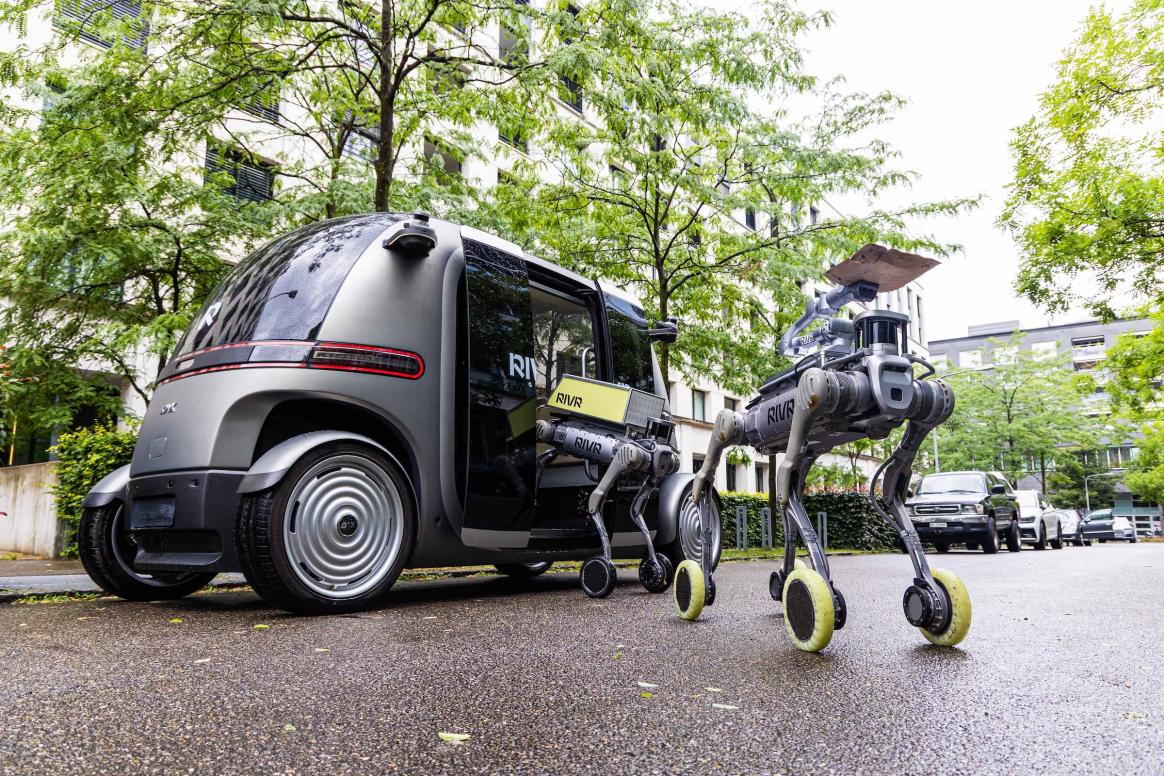
Swiss robotics technology company RIVR Technologies (hereinafter referred to as RIVR) was founded in 2023 and is dedicated to developing legged-wheel delivery robots. These robots are based on physical AI technology, enabling them to navigate urban environments freely and overcome real-world challenges such as stairs, curbs, and opening doors, thereby completing the last-mile delivery of goods.
RIVR is a spin-off from ETH Zurich and was founded by Marko Bjelonic, Lorenz Wellhausen, Giorgio Valsecchi, and Alexander Reske. Marko Bjelonic serves as the company’s CEO and holds a Ph.D. in Robotics from ETH Zurich, where he previously worked as a postdoctoral researcher at the Robotic Systems Lab. Lorenz Wellhausen is the Chief Software Technology Officer, also holding a Ph.D. in Robotics from ETH Zurich and having served as a postdoctoral researcher at the Robotic Systems Lab. Giorgio Valsecchi is the Chief Hardware Technology Officer with a Ph.D. in Robotics from ETH Zurich. Alexander Reske is the Chief Operating Officer, holding a master’s degree in Robotics from ETH Zurich and having previously worked as a research engineer at the Robotic Systems Lab.

In the last mile of logistics delivery—the crucial final 100 meters from delivery vans to customers’ doorsteps—the process is the most complex and physically demanding, often relying on human labor. Wheeled robots or drones struggle to reliably handle common obstacles such as steps and stairs, making it difficult to deliver packages directly to the doorstep. Additionally, unlike language models like ChatGPT that can be trained on vast amounts of internet data, physical-world robots lack access to large-scale, meaningful real-world data for training, which hinders the improvement of their intelligence.

RIVR has developed a legged-wheel delivery robot equipped with physical AI technology that integrates both reinforcement learning and supervised learning. This enables the robot to confidently tackle real-world urban challenges such as climbing stairs, navigating cluttered spaces, and opening doors, efficiently completing the final leg of delivery and safely bringing packages directly to users’ doorsteps.
RIVR’s universal physical AI technology incorporates both reinforcement learning and supervised learning. Reinforcement learning primarily uses simulated data. RIVR employs a trial-and-error learning approach, utilizing simulation data and parallel GPU simulations to efficiently train quadruped robots. The company has developed proprietary learning algorithms and highly realistic, gamified training scenarios that closely mimic reality, allowing robots to acquire mobility, manipulation, and autonomous capabilities within just a few days. Supervised learning, on the other hand, relies on real-world data. RIVR leverages real-world data—similar to that used in autonomous driving technologies—to enhance the robot’s ability to interpret complex scenes from camera images, enabling autonomous navigation and response. Moreover, each deployed legged-wheel delivery robot contributes valuable data to RIVR’s universal physical AI system. Through continuous expansion of the dataset and the data flywheel effect, the intelligence level of the robots is continually improved.RIVR’s legged-wheel delivery robots are built with high-reliability precision engineering, featuring robust safety mechanisms and adaptive mobility capabilities to handle complex urban environments. The robot’s wheels ensure efficient movement over flat surfaces, while its leg design enables it to easily overcome obstacles such as stairs, curbs, and uneven terrain. This unique kinematic design addresses many of the challenges associated with last-mile delivery in real urban settings. Thanks to its wheeled mobility, the robot’s battery life and speed are five times longer and faster, respectively, than those of conventional legged robots, and its coverage area is ten times greater. The robot is equipped with cameras, LiDAR, and advanced sensor systems to detect obstacles, recognize the environment, and ensure safe navigation. Its central torso structure houses powerful onboard computing and AI systems, while its mechanical arm enhances flexibility for tasks such as opening doors and handling goods. A removable delivery compartment on its back can securely store multiple packages, ensuring items arrive intact. The robot is reinforced to withstand various weather conditions, including rain, snow, wind, and high temperatures. Additionally, RIVR boasts a robust cloud infrastructure to support global operations, along with a 24/7 remote support team capable of immediately addressing any emergencies and resolving issues promptly.
In actual delivery scenarios, RIVR’s legged-wheel delivery robots can pick up goods directly from stores and complete door-to-door deliveries. They can also work in tandem with human couriers or autonomous delivery vans to transport multiple orders across cities, improving the efficiency of both last-mile and final-100-meter deliveries. Each robot can travel approximately 30 kilometers on a single charge, reach speeds of up to 15 kilometers per hour on urban streets, and carry loads of up to 40 liters. Twelve robots can cover an area of about 5 square kilometers, achieving an on-time delivery rate of approximately 90%. The operational cost is around €0.40 per kilometer, with an estimated payback period of about 18 months.
RIVR’s legged-wheel delivery robots are suitable for transporting a variety of goods, including parcels, takeout meals, fresh produce, and postal items. To date, RIVR has partnered with Just Eat, one of the world’s largest food delivery platforms; Evri, the UK’s largest dedicated parcel delivery company; Veho, a U.S. logistics firm; as well as Swiss Post and Migros Online.





